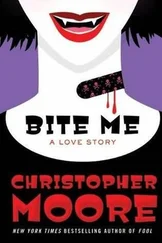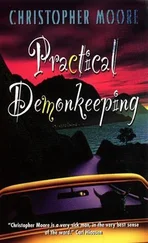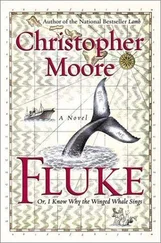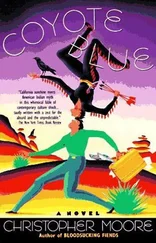Mike caught his safety lines and tugged them to make sure they were both secure before he reacted. “Holy shit,” he said.
“When a workman would fall, and he was caught by the net, he was said to have joined the ‘Halfway to Hell’ club. I think I am also in that club.”
She had an accent but not much of one, and this time she wore a black dress with a wide lace collar. Her hair was pinned back into a bun, and again, there was a flower in her hair. He didn’t know what to say, but he had been preparing himself for her to reappear, just so he wouldn’t be surprised in a bad spot and end up tumbling off the bridge to his death. Hallucination or not, he’d resolved to be prepared. He said, “There’s seagull shit all over these beams. You’re going to mess up your dress.”
“Ah, you are so gallant, but I am beyond the reach of huano de la gaviota .”
“You are Spanish, then?”
“I was born on Spanish soil, yes, right there at the Presidio, in 1792.” She pointed a delicate finger toward the San Francisco shore and the fort beyond it. “I beg your pardon, I am Concepción Argüella. My father was the governor of Alta California, commandante of the El Presidio Real de San Francisco.”
“Pleased to make your acquaintance,” Mike said. He didn’t reach out to shake her hand, or even to kiss it (that seemed like what he should do, her being so formal and everything), but he was hanging two hundred feet over the water, and she was a good twelve feet away, and if she floated over to him, he thought he might completely lose his mind, so he sort of bowed—nodded, really. “I’m Mike Sullivan, I paint the bridge.”
“Ah, I would have guessed that from your bucket of paint and your dashing coveralls,” said the ghost. “May I thank you for keeping our bridge looking beautiful? We all very much appreciate it, Señor Sullivan.”
“We?” Mike said. He was still trying on the idea of talking to a ghost; he wasn’t ready to be gang-haunted.
“There are many here on the bridge.”
“Why?” Mike asked.
“It is a place between places, and so are we, between places.”
“No,” said Mike. “Why are you here?”
She sighed, a light and ghostly sigh that was lost in the wind, and she told him.
Although I had never set foot in Spain, I was very much raised as an aristocratic Spanish lady—California was Spanish land then. I lived in the grand governor’s house in the Presidio, and my mother saw to it that I was dressed in the finest fabrics and latest fashions from Madrid. I was educated in letters by the friars and nuns of the Mission, and in the ways of the world by my mother, which is to say, despite our station in the wildest reaches of the Spanish empire, I was sheltered. I spent most of my life in our house and the gardens around it, surrounded by soldiers and priests, never venturing into the settlement of Yerba Buena. But then, when I was fifteen, there came through the Golden Gate a Russian ship, their chief officer, Count Nikolai Rezanov, seeking supplies for the Russian colony of Sitka far to the north, which was starving.
My father received the count with great courtesy, and he spent many evenings at our home. My mother was intent upon showing the Russian that even in the colonies, the manners and traditions of old Spain could be maintained. Many dinners with officers and local officials and their wives were served. Even when our home was filled with guests, I could not tear my attentions from the count. He was so handsome and worldly, and he regaled us with tales of the north and Japan, where the czar had sent him as an ambassador. I was breathless in his presence, so I would retreat to the corners, but I soon found that as often as I tried to look at him from across the room, to drink him in, I found him looking back, and my heart rejoiced. I could not hide my love behind a lace fan, and he could not disguise his attentions behind courtly manners.
Finally, he passed me a note one evening when kissing my hand and I hurried away to the kitchen just to read those few precious words: “Tonight. The garden. When the moon is over Alcatraz.” He knew, somehow, that I could see the island from my bedroom window, and after the guests had left and the house was long silent, I waited, watching the moon for what seemed months, but before it was over the island, the fog spilled in through the Golden Gate like milk poured into tea, and the night sky was nothing more than a gray shroud. I could wait no longer. Still in my party dress, I went to the garden, not even stopping to take a cloak, and before the chill could settle upon me, I saw him.
“I couldn’t wait,” he said. “The fog—I have been here all evening.”
I ran to him, then stopped, bounced upon my toes, feeling as if I might burst with excitement. He took me in his arms and kissed me. My first kiss.
In the weeks that followed I lived only for the time I could be in the presence of my beloved “Nikolasha,” and he was the same for me. He made excuses to be at the fort during the day, and I made excuses to be out and about when he was there. Even a glimpse of him during the day would make my heart leap and sustain me, until evening, when I could see him again in my parents’ house, and later, in the garden. Even as our love grew, though, so did the specter of time begin to loom over us. Nikolai had come to establish trade with the Spanish colony to sustain the struggling Russian settlements in the far north, but Spanish law dictated that the colonies could not trade with a foreign power. For all of his courtesy and goodwill, my father could not grant the count his request.
“And what if I were to marry your daughter?” Nikolai said one evening over dinner.
“Yes,” I blurted out. “Yes, Father, yes!”
My father smiled, as did my mother, for they had not been blind to our attraction, and when my father spoke, my mother smiling in a bemused manner the whole time, I knew they had discussed this possibility before it had even occurred to Nikolai.
“I would honored to grant you my daughter’s hand, but it is not in my power to enter into a trade agreement with Russia, nor, I daresay is it yours to speak for the Czar. But if you bring me a letter of permission from the Czar, sanctioning your marriage to my Conchita, then I think I can convince the king to grant a trade agreement with your colonies. In the meantime, the people of Alta California and Mission de San Francisco, will give , out of Christian charity, enough supplies to sustain the people of Sitka through the winter. No trade will have taken place, no law broken. You can deliver the supplies on your return voyage to Russia to gain the Czar’s permission.
Nikolai was ecstatic. Normally composed and ever so dignified, he stood and cheered, then apologized and bowed to everyone at the table individually, after which he sat down and collected himself.
I was in tears and my mother held me as I wept with joy onto her shoulder.
“I may be gone some time,” Nikolai said, trying to calm himself. “Even after I reach Mother Russia’s shores, I will have a long trek across Siberia to reach St. Petersburg to get the Czar’s permission. It may be more than a year before I am able to return.”
“I’ll wait!” I said.
“The Czar will likely order I stop at the other colonies on the return voyage and the journey is too treacherous in the winter. If I miss the season, I may be two years.”
“I’ll wait!” I repeated.
My father smiled. “We shall all wait, Count Rezanov, as long as it takes.”
“Forever,” I said. “If it takes forever.”
When he sailed out of the bay I felt as if my heart went with him, and I swear I could feel the tether, even as I stood on the hill above the Golden Gate and watched the mast of his ship disappear over the horizon. And I waited, after a year running to the top of the hill any time the guard announced a ship. Two years.
Читать дальше












